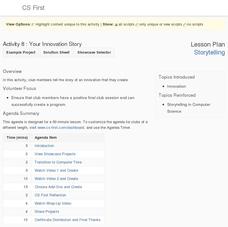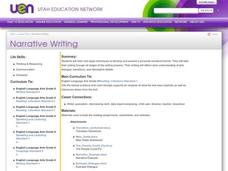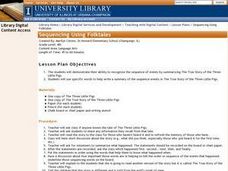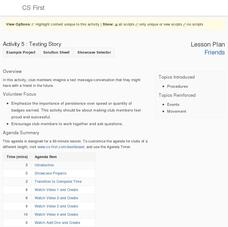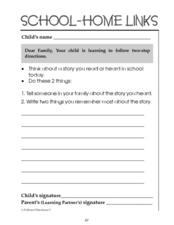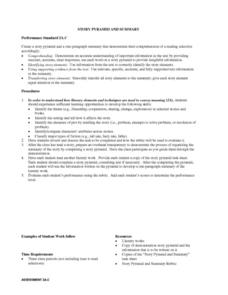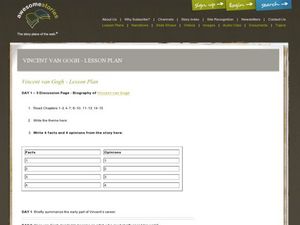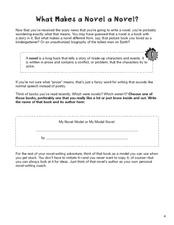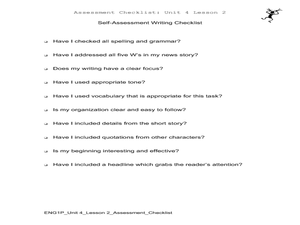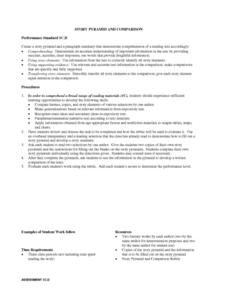Google
Storytelling: Your Innovation Story
Explore a trailblazing way to talk about innovation. Using the Scratch coding program, young computer scientists create innovations and write stories to accompany them. They include some of the add-ons they mastered throughout the unit.
Curated OER
Writing a Personal Narrative
What is the difference between a news story and a personal narrative? This plan has learners write a personal narrative using the topic of service projects in their community. Consider completing a cross-curricular extension by bringing...
Curated OER
Narrative Writing
Binoculars are used as a metaphor for good descriptive writing. Class members first view a small picture and then an enlarged view of the same image in which the details come into focus. Next, learners examine a paragraph lacking sensory...
Curated OER
Dolch Sight Words in a Story
Learners read a story with 220 basic sight words. They discuss why the words are important to identify and utilize them in their own writing assignments.
Curated OER
Compare Two Versions: Folk Tales, Sequencing, and Summary
Compare two versions of "The Three Little Pigs" (traditional and Jon Scieszka's The True Story of the Three Little Pigs, told from the wolf's point of view). As your 4th graders recount the familiar version of the story, emphasize the...
Google
Friends: Texting Story
Sometimes it's okay to text in school. Young computer scientists work in the Scratch program to write a text message conversation among friends. They use different sprites within the program to represent each side of the conversation to...
Curated OER
Literary Analysis: Summary vs. Analysis
What is the difference between summary writing and literary analysis? A 16-slide presentation offers some basic requirements for both types of writing and helps readers identify each based on keywords used in both types of writing....
Mariely Sanchez
Story Map
What just happened in that story? Kids can track the plot of any story using this worksheet. They fill in the title, author, and illustrator as well as the setting, characters, major plot points, and their own conclusion about the story.
Curated OER
Story Summary
In this summarizing a story worksheet, students tell a family member about the story and write a short summary. Students answer two questions.
Curated OER
Literature Study Guide: Gulliver's Travels
Although the title suggests this resource is devoted to Gulliver’s Travels, the materials and templates can be used with any work of literature. Readers fill out a reading schedule chart, write a summary, keep a vocabulary word list, and...
Curated OER
Literature Study Guide: Siddhartha
Though this book report form is labeled Siddhartha, the multiple-page format would work for any novel you are reading in class. Complete with a reading schedule, a summary page, a list of generic literature response questions, and a list...
Curated OER
The Mitten
Explore the Ukraine through a reading of The Mitten. Readers will determine the sequence of events, cause and effect, make predictions, and find the main idea of the story. They also use math skills to make charts and graphs. Finally,...
Curated OER
Story Pyramid and Summary
Students read a short selection of a story individually or as a class. On their own, they create a story pyramid for the selection and write a one page summary. They use text from the story for their supporting details. To end the...
Orange County Schools
Piggybook
Summarizing text is a balancing act between being brief but thorough. You need to be short and to the point, but also cover all the important details, a task that presents a challenge for many young learners. In this lesson based on the...
Curated OER
Awesome Stories: Vincent van Gogh
Who was Vincent van Gogh? Most of the questions can be answered in two or three sentences; however, there is at least one essay prompt and one personal response question that require longer answers. Questions call for a good mix of...
National Gallery of Canada
Picture This!
Introduce your class to Inuit prints and use these artworks as inspiration for a printmaking activity. Pupils make stories to go along with the images and then come up with their own heroic moments to illustrate. They take moments from...
Curated OER
What Makes a Novel a Novel?
As your authors prepare to write a hypothetical novel, they need all the inspiration they can find! Using a book they have already read (and enjoyed), learners complete a literary analysis by filling in eight short-answer questions....
Curated OER
Who Am I?
Your budding journalists need to understand the five W's for writing a news story. They read a story, complete several graphic organizers to help them organize and write their article, and then use a self-assessment worksheet to edit and...
Curated OER
How Can We Write A Story Using Dr. Seuss' Writing and Illustration Style?
Students write a story. In this writing style and illustration lesson, students review elements of Dr. Seuss' writing and illustration style and read a few more books written by him, examining the writing style. Students work in...
Curated OER
"Sunday in the Park" Reader's Response
After reading Bel Kaufman's "Sunday in the Park," give your class the opportunity to react to the short story through writing. First they write a brief summary paragraph, and then they react to any events or characters' actions in a...
Polk Bros Foundation
How to Summarize an Event in History or Today - or a Story
Ask your class to write a quick summary of a historical or current event. The worksheet offers a place to note down important details about the event, such as time, place, people, how it started, and how it ended. Pupils then take this...
Curated OER
What's the Big Deal?
Learners listen to a passage (suggested reading: "Do a Cat's Eyes Glow?") and create a map of what they hear. They use the map to write a summary. Then, they read their own passages and independently map and summarize it the same way....
Curated OER
Story Pyramid And Comparison
Students investigate the details of a chosen story of literature. They use a pyramid graphic organizer to record information. The information is used to write a summary of the story. Students use a rubric while writing the summary to...
Curriculum Corner
Fiction Graphic Organizers
Get an in-depth look into a narrative text with a three-page worksheet that examines a story's character—actions, sayings, thoughts, and appearance—setting, and challenges scholars to write a brief summary about what they've read.


